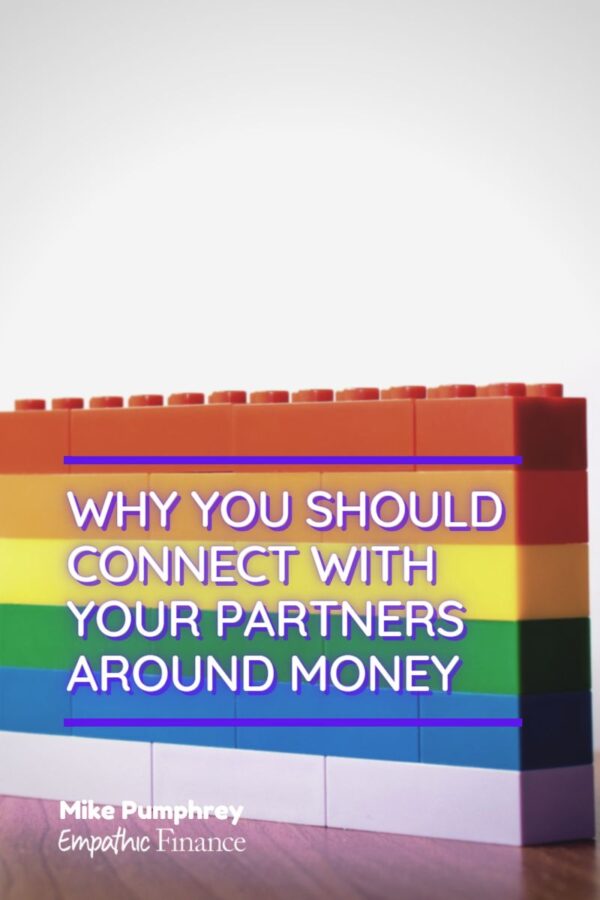Many in relationships avoid talking about money with their partners, but this can cause unnecessary conflict and prevent greater connection.
The statistics are clear: Money is the biggest source of stress for those in the U.S.A. And money is the second leading cause of divorce, after infidelity.
What’s going on here? Well, to me the answer is obvious: money plays an outsized role in our lives, and connects to almost every aspect of ourselves, from our work and hobbies, to our hopes and dreams, to our relationships.
Every one of us has an attachment style, and while we know this, fewer people know that we also have a money attachment style.
I hear from people in relationships all the time who never have any discussions around money or know how to connect with their partners around money, from either a pragmatic or emotional angle.
This is clearly hurting people, and hurting relationships.
So here are five reasons why you should connect with your partners around money.

Table of Contents
What does it mean to connect around money?
Connecting with someone around a topic need not be a difficult or arduous task. It just takes showing curiosity.
So when you can find some time where you have set aside life’s stressors, get together and start asking questions.
Here are some questions you can ask:
- How do you like to spend money?
- What do you love to spend money on and why? What lights you up about spending money on that?
- What do you hate to spend money on, and why? What do you not like about spending money on that?
- What does “having enough money” mean to you?
- What stresses you out the most about money?
- What are your money goals? What do you want to be able to achieve when it comes to money?
- Have you ever had a formative money moment in your life? How did you react at the time, and how is it meaningful to you?
And make sure that this is a two-way street. You should not only be asking the questions, but also be answering them.
Remember that the goal here is to learn, not to interrogate.
So how can this benefit you?
You can understand your partner better
One of the things I love about people asking these questions of intimate partners is that, no matter how long people have been together, in almost every case, these questions will help you learn something new. There will be some new anecdote, some new piece of information, that you didn’t know.
And isn’t that great? Isn’t it nice to know that there are aspects of a partner that are new to you? If you ever feel, as long-term couple sometimes do, that you’ve been with this person long enough that you know everything about them, these questions will dispel you of that notion. There is always more to learn about someone else.
You can grow closer
Understanding leads to greater connection. When we understand strangers, they become more than just strangers. And when we understand better those who are close to us, the effect just multiplies.
Compassion is a lot easier when you understand the “why” behind an action. Someone who keeps their credit card just-this-close to being maxed out, and when paying it down immediately charges it back up again, can be exasperating and stressful. But when you learn that there were times in this person’s life where they had an unstable existence, and money needed to be spent quickly or else it would be taken by someone else, then it’s a little easier to have compassion for this person.
(Compassion doesn’t equal complacency, of course, and I would coach this person to find a different way to cope with or express this financial anxiety. But at least their partner would understand.)
You can reduce conflict
It also follows that you can reduce conflict by connecting with a partner around money.
Conflict in relationships occurs due to misaligned expectations of behavior. I thought you would do this, but you didn’t. I wanted you not to do this, but you did.
And while every person in a relationship is capable of independent action, these misaligned expectations can cause havoc in a relationship, and lead to erosion of trust.
And since financial matters can happen multiple times in a day, there are lots of little opportunities for erosion, and possibly some big ones too.
Now, I’m not going to say that understanding someone else will lead directly to less conflict, but it can lead to a conversation about needs, both yours and theirs. When you’re feeling more compassionate and understanding toward your partner, these conversations will likely lead to more compromise and less deadlock, and fewer hurt feelings.
You can understand yourself better
So far, I’ve been focusing on how you can understand a partner, but through this process, you can also lead to a better understanding of yourself.
Look at that above list of questions. Could you answer all of them without thinking about it? I bet you couldn’t.
So when your partner seeks to understand more about how you operate and what’s important to you, you may have to figure it out for yourself first.
And that’s a good thing! Self-awareness is a key factor in successful relationships. Those that lash out in anger aren’t doing their relationship any favors. But being self-aware enough to say, “you know, when you said/did that thing, it made feel angry, and here’s why.” You tell me what’s going to have a more positive outcome.
You can become more certain about your compatibility
Using these conversations to, as it were, “get on the same page,” can lead to more confidence in your relationship. Maybe you’ve had fights in the past, but when it comes down to it, you’re basically aligned.
Or maybe not. These conversations are designed to get at the heart of a person and their motivations, and what you learn may make you more certain that you are not compatible too.
And while that may be a painful revelation, it’s also an important one. Wouldn’t you rather know now that you have a critical incompatibility, rather than endure years of conflict before you can’t ignore it anymore? I know what I’d choose.
The choice is yours
If you have never connected with your partner around money, you may have had reasons for not doing so.
Perhaps you hate talking about money. Perhaps you fear causing a conflict. Perhaps you don’t want to know something about your partner. Perhaps you don’t want to divulge something of your own.
But for all the reasons I’ve listed above, I urge you to take a leap of faith and try it. Even if you’ve had conflict around money in the past, showing up with curiosity instead of judgement will frame the conversation in a new way, and can lead to breakthroughs in your relationship.
Connecting around money can truly make your relationship more fulfilling, successful, and happy. That’s worth it.


